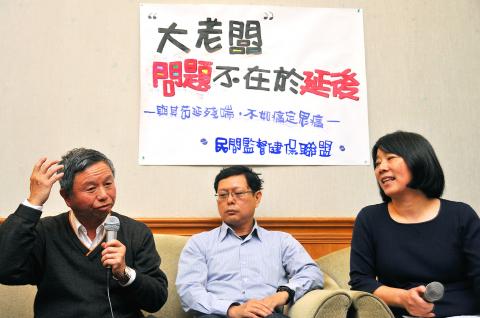If the government wants to make the second-generation National Health Insurance (NHI) program fair it should scrap the supplementary premiums mechanism and charge a premium based on household incomes, civic groups and academics said yesterday.
The critics, including former health minister Yaung Chih-liang (楊志良), told a press conference that regulations on premium calculations should be revised so that premium fees are proportional to income.
Implementation of the second-generation NHI program, which is scheduled to take effect in July, will reportedly be postponed until January next year because of concerns about its financial viability.

Photo: Chien Jun-fong, Taipei Times
The supplementary premiums, which were added to the new NHI program in January last year after the National Health Insurance Act (全民健康保險法) was amended, use different rates for various groups and income categories, and would make the new program more unfair, Taiwan Women’s Link president Huang Shu-ying (黃淑英) said.
Yaung, who saw the law amended before stepping down in February last year, said he had always insisted that the premium calculation should be based on total household income, but the legislature’s Finance Committee overturned the Social Welfare and Environment Hygiene Committee’s proposal at the last minute.
“The supplementary premium was adopted because the Finance Committee had failed to respect the proposal of a more professional committee and more than 100 experts,” he said, adding that some lawmakers “should have avoided a conflict of interest,” without elaborating.
The former minister said he was in a painful dilemma in January last year.
“If the law was not amended in time, I was not sure if it would be amended at all. At the same time, I knew the amended legislation was far from what I had hoped for,” he said.
Yaung said he still hoped the new program would be implemented sooner rather than later, because the new program benefits the underprivileged and women more than the current insurance scheme.
The former minister also said that, despite the claims made in a Ministry of Finance statement, a formula based on total household income was feasible and lawmakers should try to amend the law before the current legislative session concludes.
Explaining why the supplementary premium mechanism is unfair, National Health Insurance Civic Surveillance Alliance (NHICSA) convener Sun Yu-lien (孫友聯) said that while jobs in certain categories carry a premium of 1.47 percent, wages for part-time jobs, which are usually held by poorer people, would be charged at 2 percent.
“It is also ironic that, under the new program, a jobless person would end up paying a higher premium than someone with a monthly wage of under NT$40,000 and an underprivileged kid working in a convenience store would have to pay the supplementary premium if his working hours exceeded a certain threshold,” Sun said.
NHICSA spokesperson Eva Teng (滕西華) said the new premium regime would “neither broaden the premium base, streamline the administrative procedure nor increase premium revenue” for the government.
As the financial status of the NHI program would remain healthy at least until the end of this year and the presidential election has been concluded, Teng said it was now a good time to relaunch discussion of premiums based on household income.

The Ministry of Economic Affairs has fined Taobao NT$1.2 million (US$36,912) for advertisements that exceed its approved business scope, requiring the Chinese e-commerce platform to make corrections in the first half of this year or its license may be revoked. Lawmakers have called for stricter enforcement of Chinese e-commerce platforms and measures to prevent China from laundering its goods through Taiwan in response to US President Donald Trump’s heavy tariffs on China. The Legislative Yuan’s Finance Committee met today to discuss policies to prevent China from dumping goods in Taiwan, inviting government agencies to report. Democratic Progressive Party Legislator Kuo Kuo-wen (郭國文) said

The Ministry of Economic Affairs has fined Taobao NT$1.2 million (US$36,900) for advertisements that exceeded its approved business scope and ordered the Chinese e-commerce platform to make corrections in the first half of this year or its license would be revoked. Lawmakers have called for stricter supervision of Chinese e-commerce platforms and more stringent measures to prevent China from laundering its goods through Taiwan as US President Donald Trump’s administration cracks down on origin laundering. The legislature’s Finance Committee yesterday met to discuss policies to prevent China from dumping goods in Taiwan, inviting government agencies to report on the matter. Democratic Progressive Party

Taiwan and its Pacific ally Tuvalu on Tuesday signed two accords aimed at facilitating bilateral cooperation on labor affairs, according to Taiwan’s Ministry of Foreign Affairs (MOFA). The governments inked two agreements in Taipei, witnessed by Foreign Minister Lin Chia-lung (林佳龍) and visiting Deputy Tuvaluan Prime Minister Panapasi Nelesone, MOFA said in a news release. According to MOFA, the agreements will facilitate cooperation on labor issues and allow the two sides to mutually recognize seafarers’ certificates and related training. Taiwan would also continue to collaborate with Tuvalu across various fields to promote economic prosperity as well as the well-being of their

Sung Chien-liang (宋建樑), who led efforts to recall Democratic Progressive Party (DPP) Legislator Lee Kun-cheng (李坤城), was released on bail of NT$80,000 today amid outcry over his decision to wear a Nazi armband to questioning the night before. Sung arrived at the New Taipei District Prosecutors’ Office for questioning in a recall petition forgery case last night wearing a red armband bearing a swastika, carrying a copy of Adolf Hitler’s Mein Kampf and giving a Nazi salute. Sung left the building at 1:15am without the armband and covering the book with his coat. Lee said today that this is a serious